AFTERILOVAISK. “Lunatik”
“I realized it could be the end: either a fight to give, or to leave the environment”
Oleksandr Valeriyovych Vanyk, codename – Lunatik, “Donbas” battalion
In 2014, I was watching all the news and the events in the ATO. The fact that people were killed for the Ukrainian flag became the turning point. I came to the military commissariat during the first days, and immediately received a refusal, because my personal file had been lost and was not found during the entire war. So I started monitoring volunteer battalions that operated at that time: those were the Odesa “Storm”, “Dnipro” was already starting to form. “Donbas” wasn’t in the picture yet; nobody even knew anything about it. Wherever I called, you either had to have a registered place of residence, or… to live closer to the place of their stationing. And I lived far away, so no one took me. Then “Donbas” had a combat in Karlivka, after which they went to Petrivtsi – I called the “Donbas’s” headquarters, packed my things, and left. It was on May 30, 2014.
Before the war I had worked as a high-rise construction worker, an industrial climber in Kyiv. When the Maidan started, I quit my job. I took part in the Maidan. Then went to the war. I just left my job.
The fact that people were killed for the Ukrainian flag became the turning point.
I had had nothing to do with military affairs, I was merely interested in, for example, camouflage, a little bit of strike ball, and had gone hiking in the woods several times. It was interesting for me, and even before the Maidan I had started buying some things: equipment, camouflage. And then, when I already joined the “Donbas” in Petrivtsi, I took everything with me, and it came in handy. An assault vest, a hydration pack. They were giving me surprised glances, “How did you do this, where did you get this?” I said, “I just bought it a little bit earlier.”
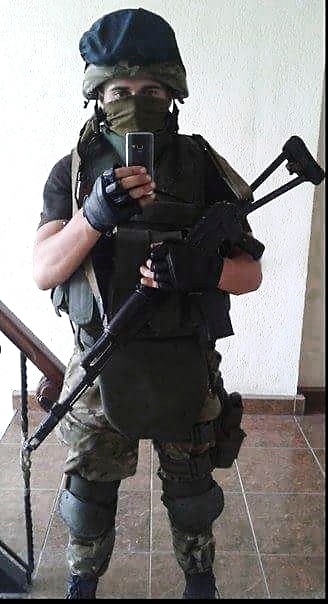
I was wounded in Ilovaisk on August 25 – a shell fragment got into my leg. I went to Mnohopillia a day earlier as a wounded. I stayed in Mnohopillia, because I was lightly wounded, so they did not take me; moreover, the corridor was already closed, and they could not take anyone out anymore. So we stayed and did not know what to do. In the morning, people started gathering in a column. All members of the Armed Forces of Ukraine began to gather; and there were also several wounded from the “Donbas”, including me. They started asking who would take us into their column.
But nobody wanted to take us. We did not know what to do when we saw that “Dnipro-1” column was approaching. We ran to “Dnipro”, because we thought that those were our men, and asked them to take us into their car. They took us into their orange “Ruta” bus. We went with them. We changed our position in the column several times. The column was getting bigger and bigger. Then at some point I saw that we approached our column. And I asked to go with our column instead. I did not see my platoon, but got into a “GAZon” in which ammunition was transported. I drove in this car, but did not see my men.
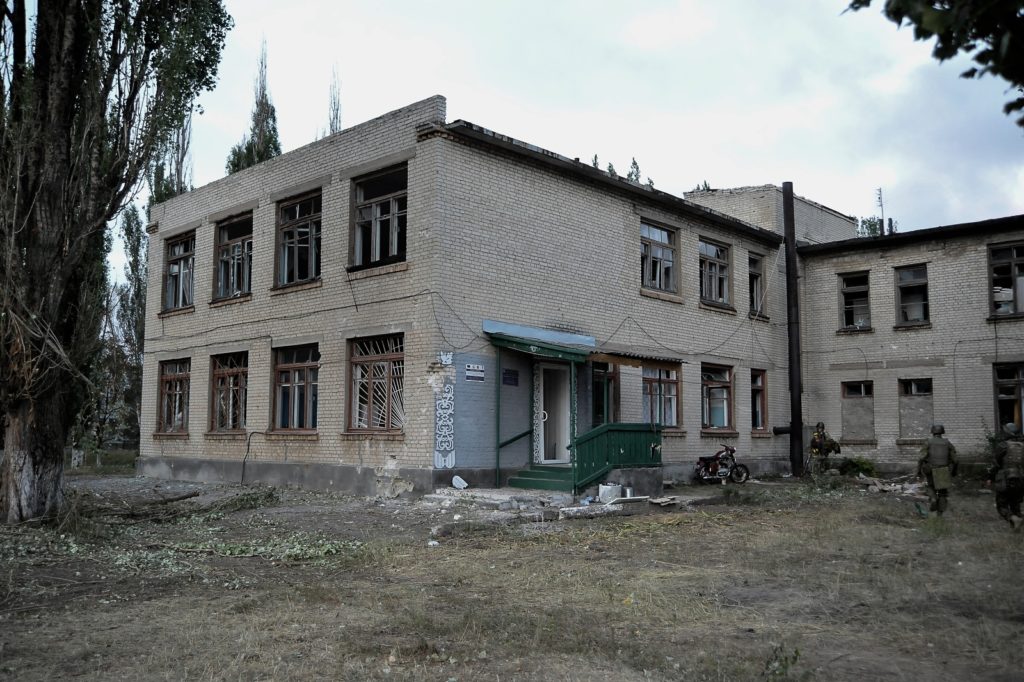
The morning of August 29, 2014. Photo: Markiian Lyseiko
When the column made a final jerk, I saw a “KRAZ” in which my platoon was driving. I waved at them, but they did not see me. So I decided that I would just stay in this “GAZon”. I did not know all those people. The fire in Mnohopillia started. That terrible picture still arises in my mind. I was somewhere in the middle of the column. It was a miracle that we survived, and it was because we had ammunition. Maybe they just did not hit us, or did not pay attention to an important object. And we slipped between burning cars.
There was a moment which I remember very well: two trucks were driving in front of us – “URAL” and “GAZon”. “URAL”, which was driving on the left, took a direct hit either from a tank or from an ATGM. There were approximately 20-30 people there; and when the car exploded, only two men out of twenty were thrown out of the car. Those twenty men just disappeared… And one of them fell onto the ground just in front of our car.
He got up covered in blood, had a khaki bulletproof vest – this was a guy from my unit, codename Kiezia – and waved. There was another car in front of us, so he jumped into it, and they instantly drove forward. There were explosions everywhere. It was horrible. I sat tightly in the car… and fired to one side, to the right – because I sat on the right side. I was shooting at plants and trees, everywhere. We reached Chervonosilske in this car, got through it, and then a tank fired into the car. We jumped out of it, and, thank God, we did it on time. Ammunition started exploding, and the explosions continued for a couple of hours.
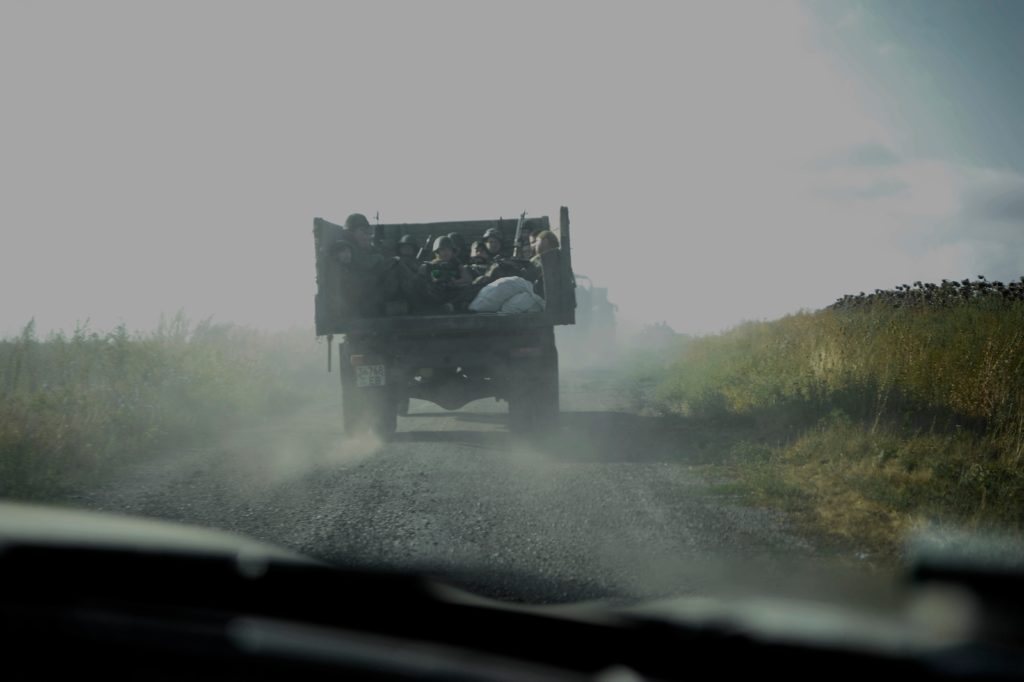
I was alone there, did not know anyone, because my platoon was driving in another car. For 15-20 minutes I was in a stupor, there was a shock, everything seemed unreal. I was thinking whether I would die now and whether this was the end. Then I decided they if I died, then I would do it with honor, and I would be shooting. We did a few shots – I saw Russians. Then the truce began, and I lay there – ammunition was exploding – probably ten different men lay in that small ditch: both from the Armed Forces of Ukraine, from the “Donbas”, and from “Dnipro” – we laid there together.
And then all of us went to look for the rest of our men. It turned out that half of the 15 people from my platoon were injured. One was KiA, Eney. He was killed in KRAZ. And one men was missing – Kyi… The rest were either seriously wounded or moderately wounded, and half of the men were unscathed. Well, we were glad that everything ended like that, that at least part of us survived and were not injured, and I already started thinking how to get out of here.
I did not want to give up. I understood that this could be the end: we either would fight or break out of encirclement. I offered our men a suggestion, and we immediately began to think where to go. I started exploring the territory and suggested that we left as a part of our platoon. Gosha, Solo, and Strannik agreed. The rest simply refused; this was their choice, and I understand them. I also had to make this choice. It was very scary, because you understood that you would either die or would be taken prisoner.
I did not think about the second option. I did not even think that both of us would get out alive – only Gosha and I decided to do this. He is from Donetsk. He said he knew this territory and knew how to get out. In fact, he did not know anything. We went as luck would have it. I broke and tore up everything we did not need, so that the Russians would not take away the bulletproof vest and assault vest. Actually, no, I only destroyed the bulletproof vest and not the assault vest. Kneepads, helmet – I threw everything away. I tore them up the way I could. I only had an assault rifle, 4 magazines, two grenades and several cartridges. And at midnight Gosha and I talked, analyzed all pros and cons, and decided that it was better to leave. It was better to have at least some chance of getting out than to be taken prisoner. At 8 p.m. Russians came in two amphibious assault vehicles and three “Kamazs” to negotiate with us and offered us to surrender. They said that they would take us to Russia, write down our details, and release us.
It was obvious that those were Russians: from their uniform, equipment, machinery.
I, for example, know a lot about camouflage. I immediately saw where men were from the army, and where they were just wearing a uniform, as we did, for example. And that was definitely Russian equipment – their markings, new assault vests. From SSO, it is their brand. It was clear that those were Russians – they were dressed properly and had new assault rifles. Then one of their officers came to conduct negotiations. The officer told us to surrender. And some members of the Armed Forces of Ukraine started to lay down weapons and leave. Those were probably 20-30 men, and their number was increasing every minute… And then we – those who did not lay down weapons, a couple of people – approached them and said, “Give us some time until the morning, so that we think this over and pack our things.” They said, “Fine.” Then they turned around and left. We had time to think the decision over.
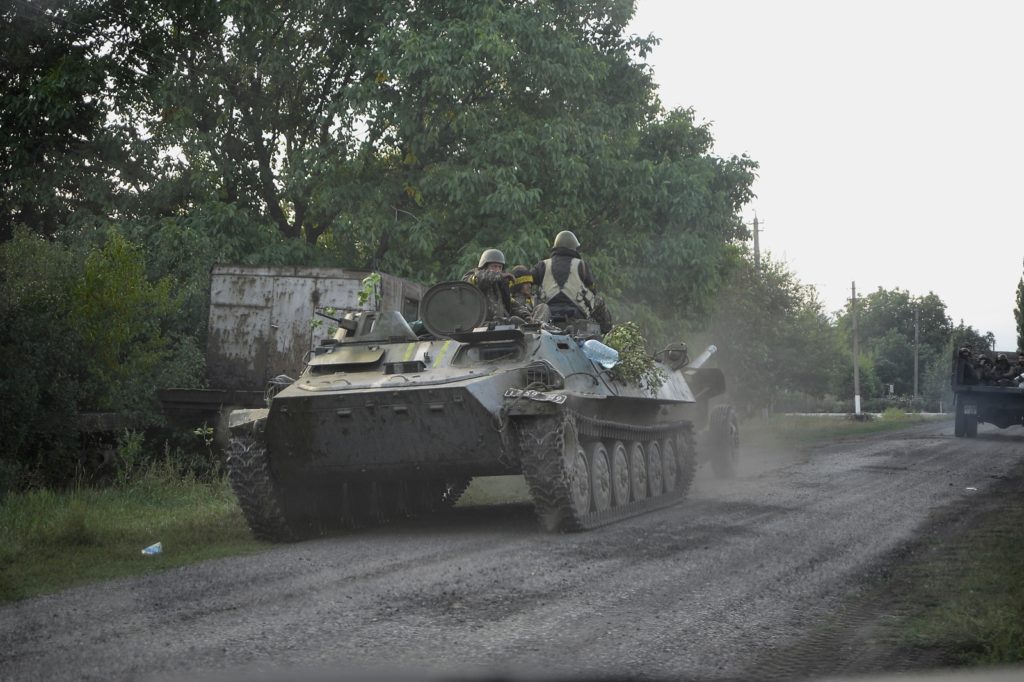
We did not know where to go at all, first we took Mnohopillia as our reference point. We were crawling, and a armored assault vehicle started moving in our direction. I thought that they already noticed us and prepared for death. But it drove straight, just past us. So we crawled through the grass and bushes and reached Mnohopillia in the morning. There we saw our positions in the dark: the exploded tank. Russian tanks were already driving in Mnohopillia, so we went through fields. Around midday, we reached the village of Poltavske, near Ilovaisk. The locals were hiding from us, because they did not know who we were. Then we reached the other end of the village and asked some bearded man, “Where are we now?” He said, “You are in Poltavske.” It is 5 kilometers away from Ilovaisk. “Damn it,” we thought. And headed in the opposite direction. We had been heading for Ilovaisk, even though wanted to go in the opposite direction.
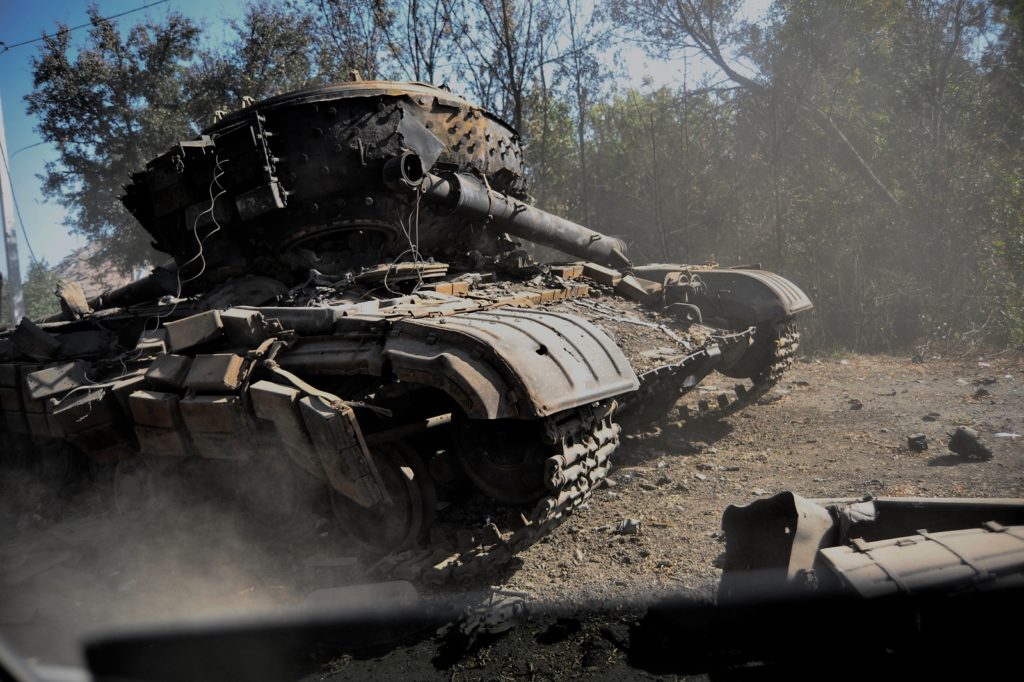
Then we reached the other end of the village. We were really thirsty. I took a Russian paratroop pot, which was a trophy, with me from Lysychansk. There was a flask, a pot, and a cup inside. So we poured water in it. It was a one-liter pot for two of us – that was all the water we had. We ran out water and entered the last house in the village. A man, his sister, and his mother lived there. We did not know who they were. But we really needed water. He came out of the house, looked at us. He spoke to us in the Ukrainian language, “And who are you?” We said, “The Ukrainian Army, we are breaking out of encirclement. There has just been a war.” “Yes, I know, come in.” We came in. This man turned out to be a real patriot. He gave us food, we told him everything, he gave us water and some food to take with us. The man also told us where to go and that we were going in the wrong direction. Then he showed us the right direction.
We said goodbye to him. When we were leaving the house we saw a separatist on the other side of the village, across the swamp; he was in the uniform and a helmet, we only did not see and assault rifle – it was either behind his back, or he had none. He was looking at us holding his hand against his forehead. Looks like the bearded man ratted us out. He was already watching for us. We ran straight to the bushes, lay there, and were ready to meet those who would be approaching. A car drove up, then a motorcycle. They started to drive in circles and looking for us. Bud they did not find us. And we got out of this village through a marsh. Then we moved further. We were walking in the scorching heat – 35 degrees perhaps – through dried fields, with that one-liter pot of water.
In the fields we came across Russian “secrets” from time to time; the locals drove there in a “Kamaz” and dropped the food straight into the “secrets”; and this helped us not walk straight to their positions.
We circumvented them, through ravines and forests. We were always going through these fields. From time to time we came across some settlements and met the locals, communicated and asked for water. Some were in patriotic mood, some were definitely separatists, and some just didn’t care. In total, we walked for six days. Periodically we stumbled upon the Russian army. There was a village, I do not remember the name, either Avangard, or Shevchenko. We came into the village, found a tomato in the garden and ate it. And some grandma came into the yard and asked, “Who are you?” We said, “We are military men. We are looking for our fellows.” We did not tell her who we were, we did not introduce ourselves. She said, “There is nobody here, you can go and take some water and go further.”
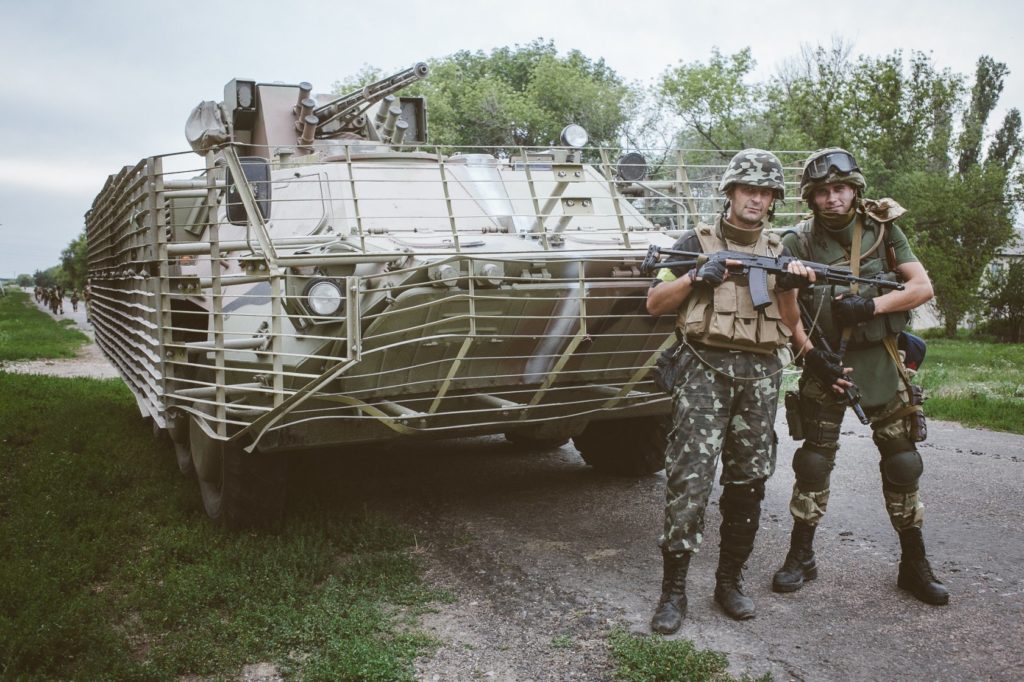
I went out of the yard: there was a railway and many trees just in front of me. I went out and wanted to go to the right, to the road. Then I turned my head to the left and saw a Russian walking across the road, and behind him, near the trees, there was lots of machinery: tanks, armored personnel carriers, infantry fighting vehicles, lots of them. They occupied the entire territory near the trees. I went back. We headed to the field instead.
We thought about whether they saw us. We waited for a while. Then we wanted to get up, went through the gardens, and saw an arch made of trees. One more Russian went out of the arch without weapons and went to the toilet. We fell to the ground and aimed our assault rifles. He did not see us and entered the toilet. I checked whether I had any knife, so that I could kill him right in the toilet. There was no knife, I had lost both of them.
We circumvented those trees… Wanted to cross this arch and saw their machinery there. It looked like that place was empty, there was no one. Gosha went first – he was lucky and passed successfully. And I turned around and saw this Russian walking out of the toilet and looking at me. I held my assault rifle beside me. I looked at him – he went further. I thought that they would shoot us right after this. But they did not react – nobody even went out. And as we were passing this village, we heard a hum of machinery to the left, it lasted probably two hours. The machinery continued to drive by. Heavy machinery. Tanks perhaps, armored personnel carriers.
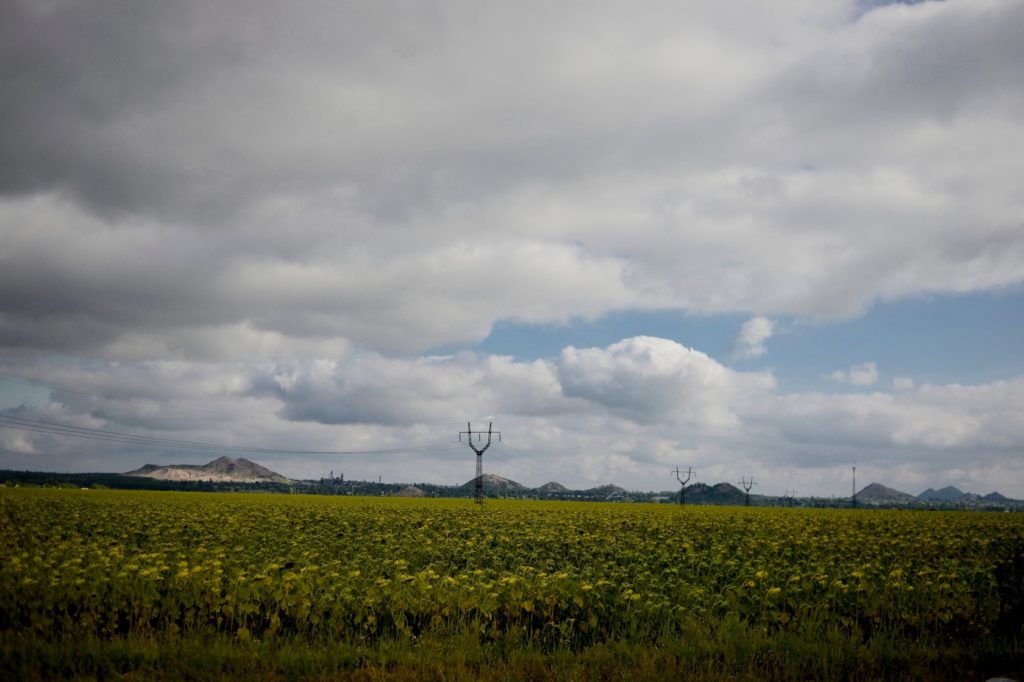
During all the way, we acted as one team. He offered one way, I offered another way, then we discussed which way was better, which one was more logical, and they chose. Not once did we argue. And this, actually, helped a lot, because if there had been a third person, we would have argued.
On the second day we came to Osykovo, it was several kilometers away from Chervonosilske. They saw a lot of machinery there: we saw the fields very well. Everything was filled with equipment. And there was some column in Osykovo, and a big lake. There were a couple hundred people near the lake. We walked near them on the other side of this lake, well, higher, but they saw us. They we standing there, looking at us, but also did not understand who we were. We went further.
There were many abandoned positions. They did everything very competently – the planting was entrenched from all sides – it would be impossible for us to storm it: they had observers and machinery everywhere, everything was done very competently – it was obvious that this had been done by the military men. There were machinery tracks, from six SPAUs (self-propelled artillery unit – editor’s note), and there were three casings next to every track.
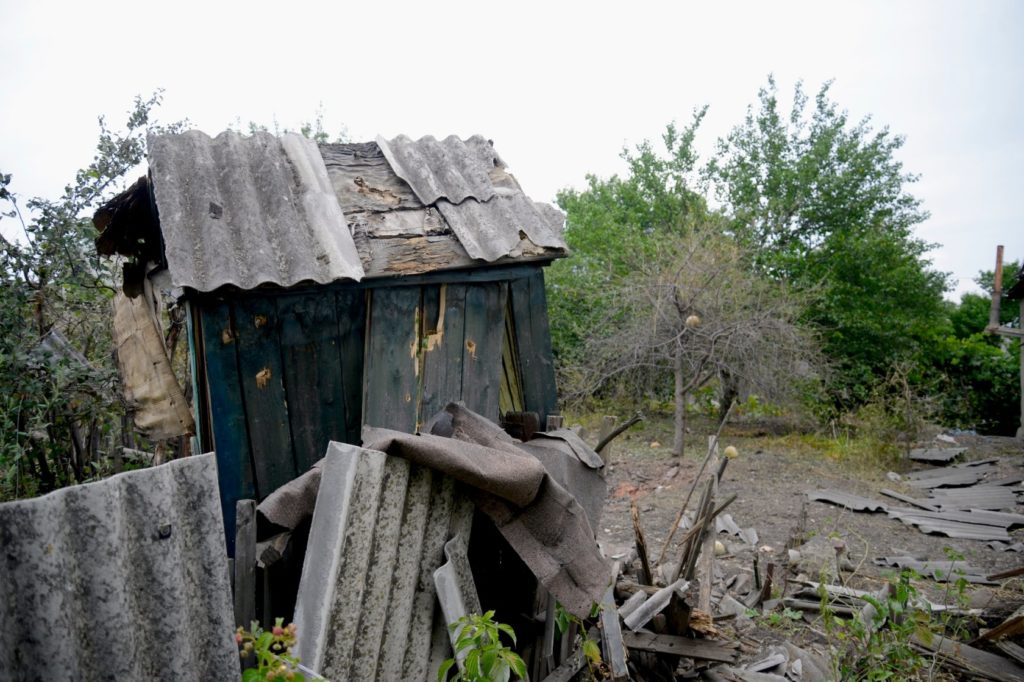
Then we went to some sort of intersection, it was already dark, and we saw a man who was walking with his son. He stopped near us – he could not see who we were. He said, “I’m carrying food for you.” We said, “No, it is probably not for us”. He said, “And you from the check point? Well, then I will go.”
We started heading towards a planting through some field, and when we almost reached it, we saw light from a phone in front of us, in 50 meters, and heard voices. We almost came across a “secret”. We just lay in the field and circumvented it. Later there were always Russian “secrets” along all these plantings: in some places we saw a phone, in some we heard voices, and in others we saw signal flare. And between these posts, an MLRS stood in the field, approximately a kilometer away from us. We did not know about it at first, we only found out when it started firing. And it fired the entire cassette – 40 pieces – in the direction of Donetsk. We then looked at the map. This was already when our military were very far, moving towards Mariupol. That is, they, the Russian military men, were just firing at Donetsk.
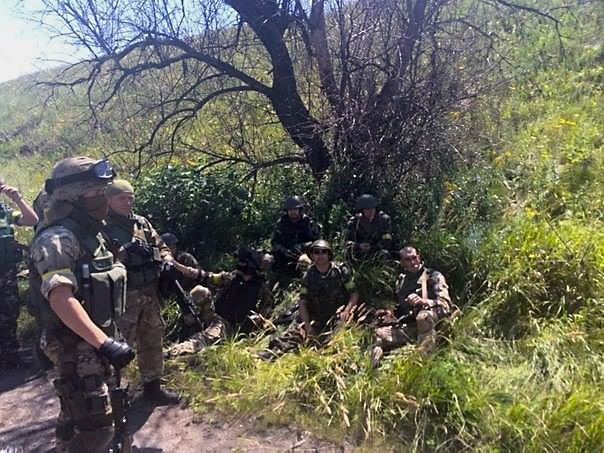
There was also a very interesting moment in Komsomolske. Many of our men managed to get out of their when the National Guard was there. The National Guard took them and left. But we only got there on the third day, and there was already no one there, we came into a virtually empty city, where separatists were already driving in their cars. On the first night, when we arrived there – at about 4 a.m. – we sat down to have some rest in high grass and fell asleep. We were exhausted, because were walking all day and night. Practically without stopping. And I woke up in the middle of the night, because my gut told me that something was wrong. Gosha was snoring, and a fully equipped Russian heard his snoring and came through the grass directly to us. Pixelated camouflage, new assault vest, and some new AK 100 assault rifle, which I had not seen before – only in pictures. He approached and was looking at us. And I raised my head half awake and immediately lowered it. He thought that I was sleeping, didn’t shoot, and said nothing. My assault rifle lay on the other side, so I could not reach it. I also had a pistol, I was sleeping on it. That is, I also could not take it out and load it quickly. I started loading it slowly and was very scared, because I thought that he would shoot me. He was also considering whether he should shoot, and while I was loading the pistol, Gosha woke up and said, “Let’s get up and go.” And I… I was thinking what I should do. I said in Russian, “I am so fed up with those ukrops [right-wing Ukrainian patriots].” I turned my head, and saw that the Russian was no longer there. I grabbed Gosha, and we ran away into the field. Gosha asked me, “Why did you speak like that?” I said, “A Russian guy was standing and looking at you, while you were sleeping and snoring, so we got very lucky.”
We were walking along the forest and speaking, when we saw an ambulance – a new Peugeot with orange stripes. I told Gosha jokingly, “Those are probably separatists.” He said, “Yeah, probably separatists.” The ambulance braked. We were about 50 meters away from the road – very close and clear as day, there was nowhere to hide at all. Then we heard screams, and Russians jumped out, “Lie down! Lay your weapons to the ground! We will shoot.” So we turned around and saw six Russians who jumped out – they were also fully equipped – and aimed their assault rifles at us. We started to run. Abruptly. In a few seconds, the Russians started firing at us. First they were shooting at our feet, because we saw pieces of earth flying into the air and did not hear whistles. Then we started zigzagging; they just could not shoot precisely at us. It is very strange how six men did not manage to shoot precisely at two men that were 50 meters away from them. Then they started firing severely, because I could hear bullets whistling above my head. We ran, and started to split in different directions – I ran closer to the forest, whereas Gosha ran closer to the field, so that they would split. And somehow I reflexively took an assault rifle with one hand and started shooting in their direction. They got quiet. Maybe I wounded someone, or may I killed someone, or they just got scared and lay down.
Later we met in the next forest, which was perpendicular, and started to run further to the next road. We stopped a car, in which two men sat. The car turned around and drove in the other direction. When we looked back we saw the Russians standing on the road behind hill, we could only see their helmets and the ambulance. They did not chase us further.
The locals drove us to some quarry. We went to a guard at the quarry and asked for water to drink. He gave us his bottle to drink from, and we sat down to rest near his booth. Then we saw him calling on the phone, coming out of the booth, and looking at us, so we realized that he was ratting us out and ran to the quarry. We sat down to rest and to look at the view.
In those settlements there were always some local men at the crossroads, who told the Russians about who was going and where they were heading. We noticed this all the time.
We saw some GAZelle car driving in the quarry. There were a couple of people sitting inside. It stopped far below; one of the men went out and looked at us. We aimed our assault rifles, so he could see that we were moving. He got into the GAZelle and drove away. At the top, when we started walking, this GAZelle began to drive in our direction – he saw us, turned around, and left. An hour later, when we were walking through the fields, we began to approach some settlement, where there was a small reservoir and a dam. And artillery – a 150-mm howitzer – started firing at the place where we were walking – there was a road which led to this village. Pieces of earth from the explosions even fell down on us. If we had gotten there 10 minutes early, they would have killed us.
When passing that village, we approached a guard and asked him who was there and what was going on. He said, “There was no one here – no Ukrainians, no Russians, no one. Everything is calm.” That was fine. We went further. In the field we wanted to lie down a little and have some rest. We wrapped into straw and lay there. Ten minutes later, we heard an MLRS. I was right near us somewhere. 5 or 7 rockets. They landed directly near us, in fifty meters. We got up and just walked further- we already did not care. We walked through fields, there were no settlements, it was night and we were running out of water and were constantly coming across a river. The river was wide. It was very difficult to swim across it, and we were too afraid to do this. It must have been Kalmius. It then turned into a reservoir; it was so wide…
We walked all night. In the morning we lay down to rest once again. We lay down there for an hour and continued to walk. There was no water – we already started having hallucinations that some Russians were running around, started firing assault rifles. We were out of water. We reached a swamp and turned back. When we were walking back, a real miracle happened: we saw a bottle of water on the ground. I came forward and picked it up. It was cold. And it was mineral water. One and a half liters of mineral water. Practically fresh mineral water. I don’t know how it got there. But that bottle of water saved our lives. And in a few hours we reached Styla.
We found a guard there. He was guarding a farm. He gave us some dumplings and grapes. That was a really good man, and he told us that now Styla was empty, everyone had left this place. There had been the Ukrainian army there, but they had left too. But a few days ago, he heard an MLRS. He advised us where to go. We decided to stop some car. A Zaporozhets car braked: there was a father and a son inside. They drove us to the center of Styla. In those settlements there were always some local men at the crossroads, who told the Russians about who was going and where they were heading. We noticed this all the time. But they did not notice us, since we lay on the floor of the car. We drove there for a while.hen we once again decided to stop a car in order to go further in that direction.
When we stopped the first car, they said that they would not take us.” “All right, go.” One man stopped and drove us for about 20 kilometers. We thanked him a lot. He was a really good pro-Ukrainian man. We told him who we were, and he said, “Yes, I understand you.” He told us where separatists were located at that time, where we should go and where we shouldn’t. That advice helped us a lot later.
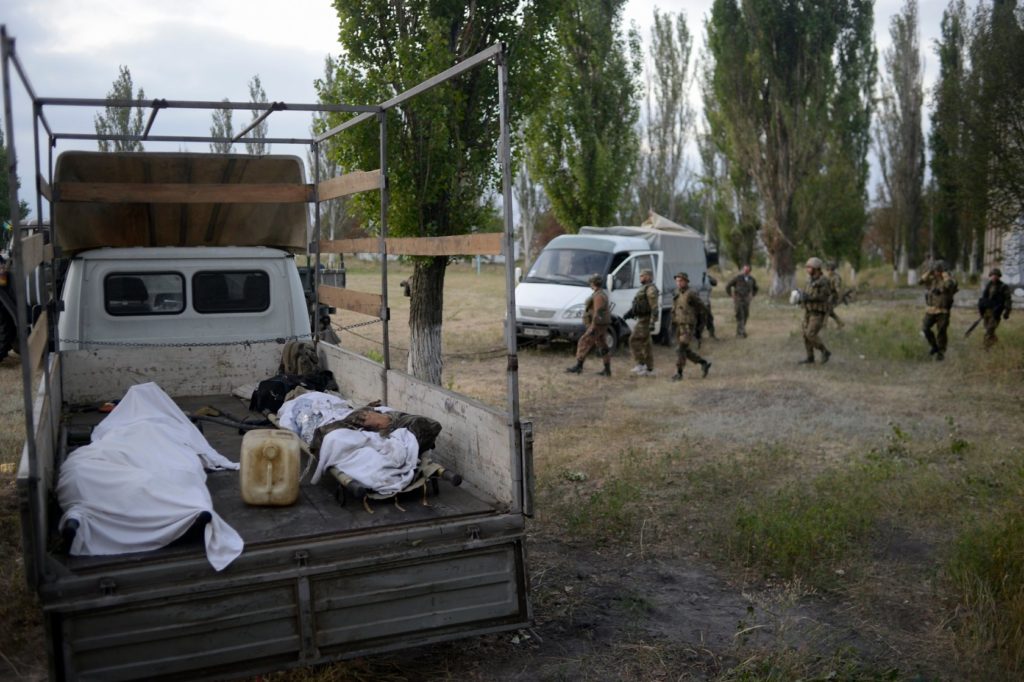
Then we walked almost to Dokuchaevsk on foot. Then we went to some motor transport enterprise and was a Ukrainian flag hanging there. We were very surprised, because it was strange to see it in these territories. And a two-meter-tall man went out of the building. He was very big, probably as three of us taken together. He looked at us, and we looked at him. We did not know what to do, who were we? Another man approached and they asked us, “Who are you?” We said, “The Ukrainian Army, we are breaking out of encirclement. They said, “Ooh, how can we help you?” We said, “Give us some water and, maybe, a cell phone, so that we make a call.” He brought a cell phone, I put my sim-card into it, but we could not connect. So they turned around and left, having wished us good luck.
Those were pro-Ukrainian people, as it turned out. As we figured out, separatists were holding Dokuchaevsk at that time. There was no army: neither Ukrainian nor Russian; separatists controlled the territory. We drove through that town in a column before, when we were heading to Ilovaisk. We drove through Dokuchaevsk four times, so I remembered a little which way we had to go. But it was still scary – we did not know where we could come across someone.
We once again came into the nearest house, which was a big two-story building, which had not been finished yet, and asked for water. The woman brought us water. We chatted a little; they also turned out to be pro-Ukrainian people, who also gave us some food. They brought us such a big bowl of meat – this was the first time we ate fresh meat. Because once we had been given salted meat before. We ate it. Then her husband came out, and we talked. They said that our army did not stay here for a long time. There only had been check points, but they had also been removed a couple of days ago. Those were very kind people. It turned out that their son was pro-Russian at first, he participated in rallies in Dokuchaevsk. But when serious war began, he became much more neutral. This happened because a house he lived in was burned down by an MLRS. He hated both sides, because he didn’t know who burned his house down.
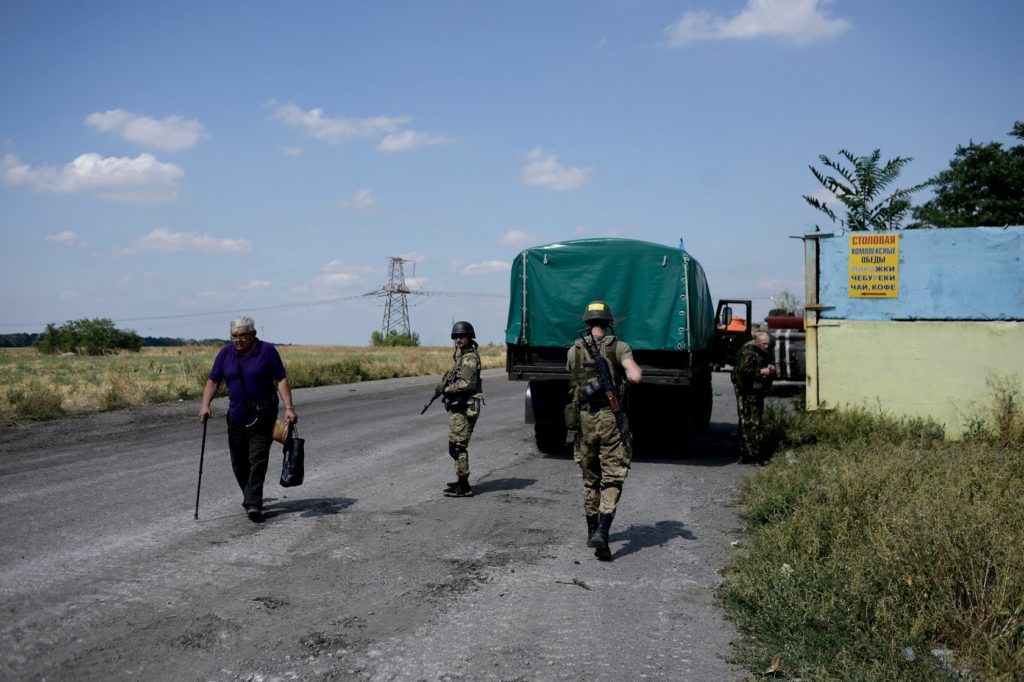
We stayed there all day. They had an unfinished kitchen. So we sat there. We laid out all the property we had: assault rifles and grenades to defend ourselves, in order to throw grenades and shoot, if someone stormed the house. And when it was already dark, their son agreed to walk us out, he knew where to go. When a car drove by, we fell to the ground. He walked us out of Dokuchaevsk and gave us a map in the end. This was his personal map of the Donetsk region, a good map. He gave us some money and wished us luck. It is very nice that a neutral person who had been pro-Russian before treated us like that. We asked him, “Why did you do this?” He said, “You came to my parents’ house as victims of this war, did not demand anything, did not threaten them, you just asked them for help. I respect you for that and wish you good luck.”
When we were walking out of Dokuchaevsk, we saw a “Kamaz” and a jeep at the town’s exit. There were either separatists or Russians in the “Kamaz”, – but only a few people. Then they turned around and left. So we easily walked down the road. We got to the Donetsk-Mariupol highway and almost reached Volnovakha down this highway. The last check point they had was in Novotroitske. We circumvented it and continued to go further on foot.
We even charged Gosha’s cell phone at some people’s in Dokuchaevsk. Then we made some calls; he called home and said that he was alive, that we were getting out, and that he would be home soon. I also called home, my parents were gone, so my brother picked up the phone, and I told him that I was also alive, and that we were breaking out of encirclement. Ten minutes later I received a call from my town, Malyn, Zhytomyr region. They introduced themselves as members of the Security Service of Ukraine and said, “We will help you get out”. I asked them, “How?” “Well, I’ll call my men, and they will tell you.” I said, “No, thank you, we will get out ourselves.” At that time, we did not trust the authorities or the army very much, because we thought that we would be shot. Because things that happened were not accidental. We even were afraid of going to our check point, because they could shoot us, if they found out that we left the Battle of Ilovaisk – we had seen a lot.
In Dokuchaevsk, Gosha called our guy from “Donbas”, who picked us up near Volnovakha and drove to Mariupol. There were already tanks before the check point, everything was serious.
We were almost crying when we got out of the car and saw a Ukrainian flag on the check point at last. There everyone started hugging us and asking, “Where have you been?” We were covered in mud; our clothes were torn…
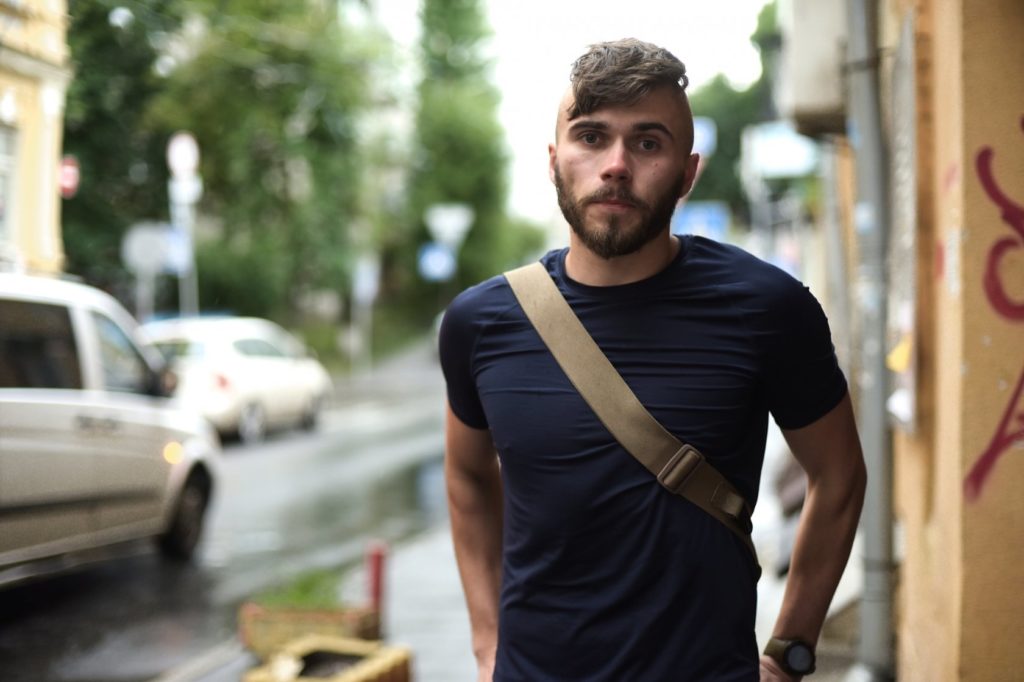
After Ilovaisk I was in “Donbas”, but I did not have any documents. All my documents had burned. All military service records, passport, code, and army reservist’s certificate: I returned without any documents at all. When we arrived in the “Donbas” base in Petrivtsi, nobody met us there. We didn’t see any people from the “Donbas”. No one cared about us. The command did not come. When I came I had nothing – no clothes, no money, no documents.
Six months later, employees of the Security Service of Ukraine called my brother, who was passing exams in Kharkiv, and started asking him about me. He told him everything they asked about. The final question was, “When was the last time you saw your brother?” He said, “He’s actually at home now. He’s getting the documents reissued.” And they said, “What do you mean “at home”? But he is a missing person.” He said, “No, he broke out of encirclement.” “Oh, fine, goodbye.”
When I got the documents reissued, I started looking for a new place to fight. I applied to Kirovohrad special forces, then served in the “Storm” company for some time. Then I returned to “Donbas” and served there until September 2016. Now I’m recovering a little and looking for a job. I am currently entering a university. I am thinking about either starting some business with Gosha or going back to war…

